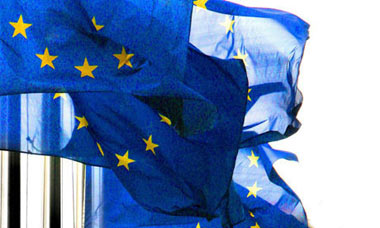Chancellor to keep Osborne and Cable in the picture as Britain is pressed to join emergency action on EU debt crisis Alistair Darling is flying to Brussels to join EU chiefs to rescue the sinking euro. Photograph: Eric Piermont/AFP/Getty Images As Britain's political leaders negotiate and plot through the weekend, the chancellor, Alistair Darling, will today attend a meeting of the European Commission and EU finance ministers. European leaders are to agree a hugely controversial bailout today to avert a "systemic crisis" of the single currency, with Britain under intense pressure to participate. Following a summit of the leaders of the 16 eurozone countries that ended early yesterday morning, the ministers are gathering to create a safety net for the euro. European leaders made clear yesterday that rescue arrangements had to be in place before the markets open tomorrow morning. On Friday night, EU leaders were presented with a sobering graph of possible bond spreads in the markets, showing that within weeks Portugal, Ireland and Spain could face unaffordable rates for raising money on the markets, parallel to the soaring costs that have brought Greece to its knees. It was not clear last night how Darling would respond. But tonight's decision will be taken by a qualified majority of 27 finance ministers, meaning that Britain could be outvoted unless it gains several sizeable allies. Although the immediate crisis affects the euro, legally all 27 EU states have to invoke article 122 of the Lisbon treaty, which stipulates that the union can come to the rescue of a member state "in exceptional circumstances". The treaty's drafters had in mind natural disasters or massive energy shortages in an EU member state, but Friday night's summit decided that the single currency crisis counted as "exceptional circumstances". The scale of the crisis facing the euro has been such that on Friday, even as final results were coming in that pointed to a hung parliament, Darling was speaking to fellow finance ministers and central bank governors of the G7, who agreed to monitor the turmoil caused in Europe by the Greek crisis. Gordon Brown was also involved yesterday, speaking to fellow European leaders from Downing Street, including French president Nicolas Sarkozy and Spanish prime minister José Luis Rodríguez Zapatero about the dangers facing Europe. Sarkozy has called for a "general mobilisation" to deal with a "systemic crisis" in which 13 of the 16 eurozone countries are under surveillance for running excessive deficits. "He has had phone conversations individually with President Sarkozy and prime minister Zapatero about the European crisis, and he will make further calls this afternoon," a Downing Street spokesman said yesterday. "The prime minister believes that a common European approach is necessary to ensure growth and stability in Europe and to respond to the market stress in the eurozone." Although no formal proposal has been put forward for today's meeting in Brussels, what is being discussed is the creation of mechanisms to help countries in danger of replicating Greece's economic woes and the creation of a ¤70bn emergency fund to protect the euro against aggressive speculation. The proposal is expected to be discussed by the European commission before being put to finance ministers later in the day. Under the hung parliament's "purdah" rules, Darling would need to consult his Tory and Liberal Democrat opposite numbers – George Osborne and Vince Cable – in the event that any important decisions needed taking. Brown and Darling's continuing negotiations have been forced by the serious nature of the economic crisis facing Europe even after the announcement by Sarkozy and German chancellor Angela Merkel early yesterday that the eurozone nations will set up a financial defence plan by the time markets open tomorrow to shield their shared currency against further attack. Concern has been focusing in particular on Spain and Portugal's fragile financial systems, which have already been hammered by the markets in the wake of the Greek debt crisis.Alistair Darling joins EU plan to rescue sinking euro

Top stories
Sunday, 9 May 2010
Posted by
Britannia Radio
at
15:20
![]()






















